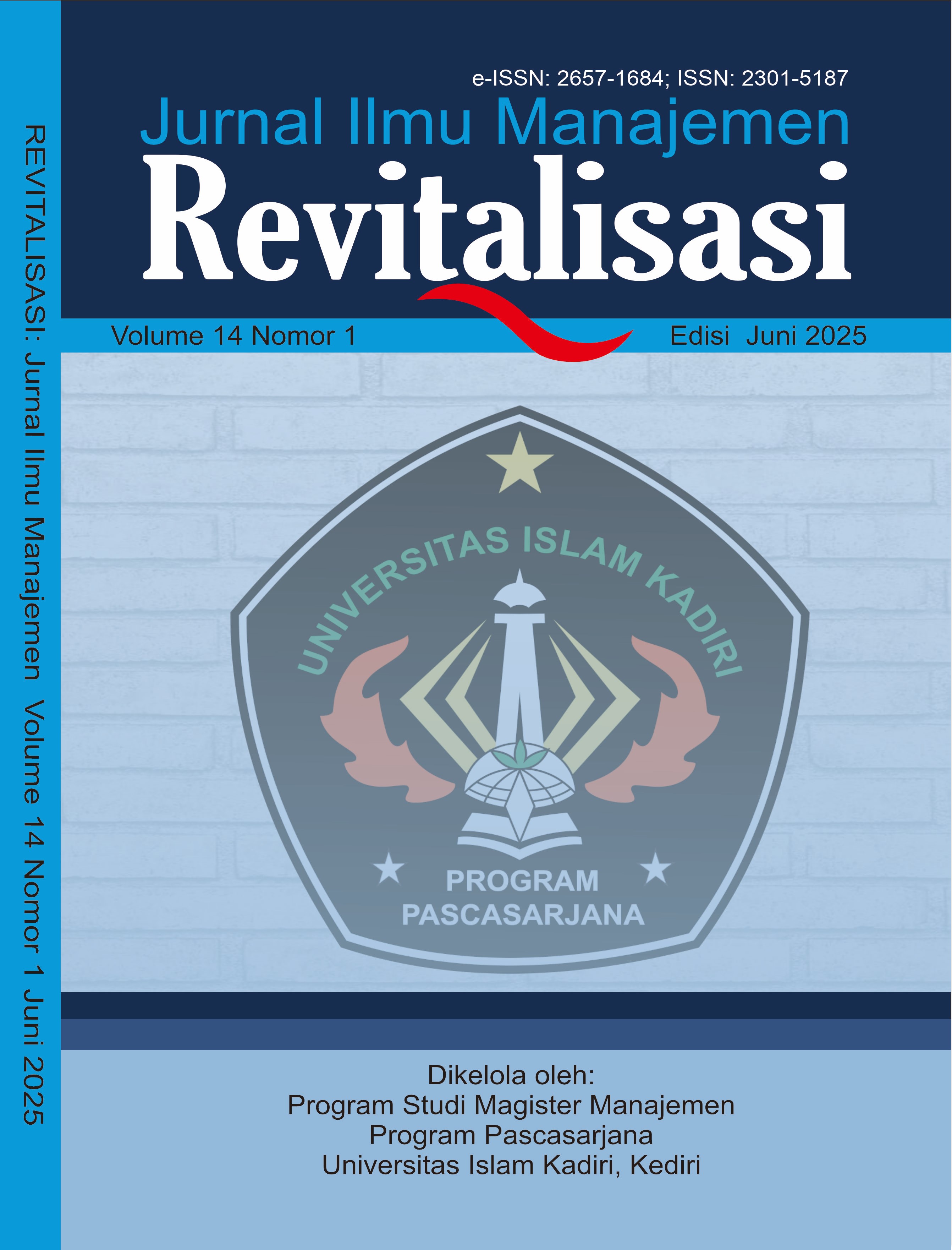Pengaruh Efikasi Diri dan Lokus Kendali Terhadap Kinerja ASN Melalui Learning Agility
Abstract
The objectives of this study, namely (1) To analyze the effect of self-efficacy on performance of the State Civil Apparatus (ASN) in Ende Regency; (2) To analyze the effect of locus of control on the performance of the State Civil Apparatus in Ende Regency ; (3) To analyze the effect of learning agility on the performance of the State Civil Apparatus (ASN) in Ende Regency and performance of the State Civil Apparatus (ASN) in Ende Regency; (4) To analyze the mediating role of learning agility in the relationship between self-efficacy on the performance of the State Civil Apparatus ASN) in Ende Regency; and (5) To analyze the mediating role of learning agility in the relationship between the locus of control and the performance of the State Civil Apparatus (ASN) in Ende Regency. agility in the relationship between locus of control on the performance of the State Civil Apparatus (ASN) in Ende Regency. (ASN) in Ende Regency. This research uses quantitative methods. The population in this study amounted to 4,674 and the sample of this study amounted to 318 respondents. The type of data used is quantitative data. Data sources used primary data and secondary data. This research uses smart PLS. The results of The results of this study, namely (1) self-efficacy has no effect on the performance of the State Civil Apparatus (ASN) in Ende Regency performance of the State Civil Apparatus (ASN) in Ende Regency; (2) locus of control affects the performance of the State Civil Apparatus (ASN) in Ende Regency; (3) learning agility has an effect on the performance of the State Civil Apparatus (ASN) in Ende Regencyon the performance of the State Civil Apparatus (ASN) in Ende Regency; (4) learning agility cannot mediate the effect between self-efficacy on performance, and (5) learning agility can mediate the effect between self-efficacy and performance. learning agility can mediate the effect between locus of control on performance.
References
Amalini, H. F., Musadieq, M. Al, & Afrianty, T. W. (2016). Pengaruh Locus of control terhadap kepuasan kerja dan kinerja (studi pada karyawan Perusahaan Daerah Air Minum (PDAM) Kota Malang). Jurnal Administrasi Bisnis, 35(1).
Britt, S., Cumbie, J., & Bell, M. (2013). The influence of locus of control on student financial behavior. College Student Journal, 47(1), 178–184.
Cahyadi, W. (2022). Pengaruh Efikasi Diri Terhadap Keberhasilan. PT Inovasi Pratama Internasional.
De Meuse, K. P. (2017). Learning agility: Its evolution as a psychological construct and its empirical relationship to leader success. Consulting Psychology Journal: Practice and Research, 69(4), 267.
De Meuse, K. P. (2019). A meta-analysis of the relationship between learning agility and leader success. Journal of Organizational Psychology, 19(1).
Dewi, I., & Tenaya, A. I. (2017). Pengaruh Etika Profesi, Efikasi Diri, Kecerdasan Spiritual, Kecerdasan Intelektual, Dan Kecerdasan Emosional Terhadap Kinerja Auditor. E-Jurnal Akuntansi Universitas Udayana, 19(1), 654–682.
Ghozali, I., & Latan, H. (2015). Partial least squares konsep, teknik dan aplikasi menggunakan program smartpls 3.0 untuk penelitian empiris. Semarang: Badan Penerbit UNDIP, 4(1).
Gravett, L. S., Caldwell, S. A., Gravett, L. S., & Caldwell, S. A. (2016). What is learning agility? Springer.
Hair, J. F., Ringle, C. M., & Sarstedt, M. (2011). PLS-SEM: Indeed a silver bullet. Journal of Marketing Theory and Practice, 19(2), 139–152.
Hikmah, A. N. (2020). Pengaruh Reward dan Efikasi Diri Terhadap Kinerja Dimediasi Variabel Motivasi (Studi Empiris Karyawan Bank BTPN Probolinggo).
Khildani, A. C., Suhermin, S., & Lestariningsih, Ma. (2021). Pengaruh Efikasi Diri dan Lokus Kendali terhadap Kinerja Karyawan Melalui Learning Agility. Jurnal Manajemen Dan Keuangan (JMK), 10(2), 208–228.
Lunenburg, F. C. (2011). Self-efficacy in the workplace: Implications for motivation and performance. International Journal of Management, Business, and Administration, 14(1), 1–6.
Mangkunegara, A. A. A. P. (2017). Manajemen sumber daya manusia perusahaan.
Mathis, R. L., Jackson, J. H., Valentine, S. R., & Meglich, P. A. (2017). Human resource management 15th ed. Cengage Learning.
Mian Nainggolan, Christoffel, K., & , Greis, S. (2018). Analisis Pengaruh Internal Locus of Control Dan External Locus of Control Terhadap Kepuasan Kerja Serta Dampaknya Terhadap Kinerja Tenaga Kependidikan Di Fakultas Ekonomi Dan Bisnis Universitas Sam Ratulangi. Jurnal Riset Ekonomi, Manajemen, Bisnis Dan Akuntansi, 6(4), 4023–4032.
Modise, D., & Rambe, P. (2017). Internal and external locus of control of engineering workforce in a power distribution utility: Implications for job performance. African Journal of Business and Economic Research, 12(2–3), 113–147.
Mukrodi, M., & Reza, M. (2018). Pengaruh efikasi diri terhadap kinerja karyawan pt express kencana lestari (express group) depok. Jurnal Ilmiah Prodi Manajemen Universitas Pamulang, 6(1), 88–94.
Pratomo, R. (2022). Pengaruh efikasi diri terhadap kinerja karyawan dengan keterikatan karyawan sebagai variabel intervening. Jurnal Manajemen Terapan Dan Keuangan, 11(04), 1021–1033.
Rahmawati, T. (2016). Pengaruh Kecerdasan Emosional, Kecerdasan Intelektual, Kecerdasan Spiritual, Dan Etika Profesi Terhadap Kinerja Auditor Dalam Kantor Akuntan Publik (Studi Empiris Pada KAP Di Jakarta Selatan). Universitas Satya Negara Indonesia.
Rofi, A. N. (2019). Efikasi Diri, Beban Kerja Dan Kepuasan Sebabai Faktor Penentu Kinerja Pegawai. EconBank: Journal of Economics and Banking, 1(2), 97–107.
Saprudin, S., Rosyaty, T., & Syukron, A. (2019). Relationship between Organizational Culture and Locus of Control with Bogor Regency Employee Performance. International Review of Management and Marketing, 9(4), 143.
Subroto, S. (2017). Analisis Pengaruh Locus of control dan Stres Kerja Terhadap Kinerja Pegawai. Riset Manajemen Dan Akuntansi, 8(1).
Zaki, W., Ali, A., Bakar, A., & Sarwar, B. (2019). Role of Self-Efficacy in The Relationship of Training and Employee Performance. Paradigms, 13(1), 67–73.

This work is licensed under a Creative Commons Attribution 4.0 International License.
 This work is licensed under a Creative Commons Attribution 4.0 International License
This work is licensed under a Creative Commons Attribution 4.0 International License




















